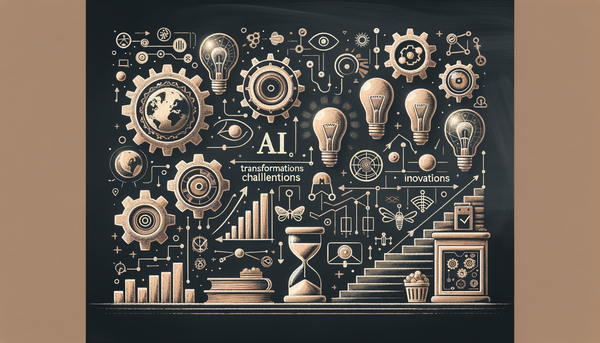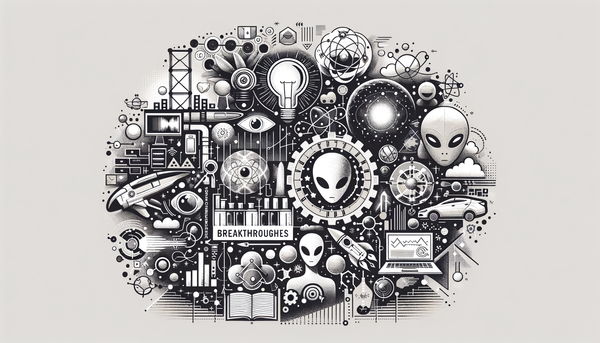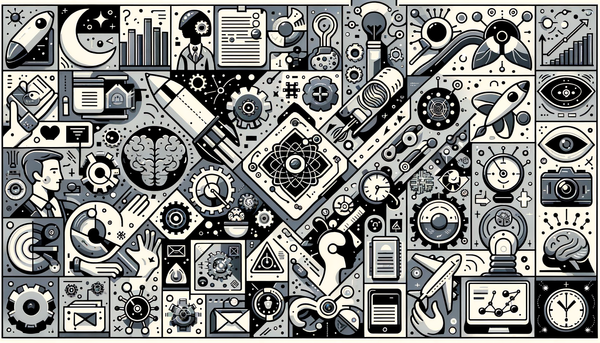AI News Updates

This article delves into the multifaceted world of Artificial Intelligence, exploring groundbreaking public interest initiatives in France, transformative corporate applications, and the ever-present challenges of security in the digital age. Drawing on recent developments—from a $400 million foundation for public interest AI and a staggering 109 billion euro investment in France to innovative business tools and emerging cybersecurity threats—we embark on an in-depth journey that not only illuminates these advances but also contemplates their broader implications on society, ethics, and the future of global technology.
Transforming the Global AI Landscape with Ethical and Strategic Investments
The unfolding narrative within the global Artificial Intelligence arena is as complex as it is exhilarating. Across the world, governmental bodies, private enterprises, and philanthropic organizations are increasingly recognizing that the benefits of AI—as well as its potential risks—demand thoughtful, sustained investments. A prime example of this trend is unfolding in France, a country historically known for its rich culture and intellectual legacy, which is now emerging as a pivotal global player in steering ethical AI development.
Recently, French tech companies along with government support and philanthropic backing have come together to create a $400 million foundation aimed squarely at promoting public interest AI. This initiative, orchestrated by France’s digital minister, speaks volumes about the nation’s commitment to ensure that AI innovations serve the collective good rather than just commercial interests. The foundation is set to serve as a beacon for responsible innovation by guiding the development and implementation of AI technologies for the betterment of society.
This drive towards ethical and publicly beneficial AI is not simply a reaction to commercial pressures; it is a strategic positioning by France to be at the forefront of global AI governance. With European nations increasingly scrutinizing and setting standards for ethical AI usage, France’s resolute effort underscores its aspiration to lead in shaping a future where technology and societal values are intrinsically linked. As
“Ensuring that technology serves us rather than controls us is paramount,”
resonates as an echo of the collective will behind these initiatives.
Complementing this philosophy is another significant move within France—the announcement of a colossal 109 billion euro investment to boost its AI industry. This unprecedented capital injection is poised to strengthen the country’s industrial and research capabilities, fueling advancements across startups, academic research, and established corporations alike. The aim is clear: accelerate the growth of the AI sector, enhance technological innovation, and create a fertile environment for economic development and employment. For those looking for more local insights, you may cross-check this evolution on our Exploring World Artificial Intelligence page at AI.Biz.
Together, these initiatives lay the foundation for a balanced AI ecosystem where ethical governance and robust economic growth go hand in hand. If one recalls the words by Fei-Fei Li,
“If our era is the next Industrial Revolution, as many claim, AI is surely one of its driving forces,”
then it is evident that France is positioning itself as a key influencer in this transformative period.
Corporate AI Adoption: Scaling and Streamlining Business Operations
Not only are governments and philanthropies heavily investing in AI for the public good, but businesses worldwide are also harnessing AI to transform day-to-day operations. One shining example of this is seen with monday.com, a company that’s revolutionizing business workflows through an innovative AI vision. The company’s focus is on streamlining processes, enhancing operational efficiency, and ultimately empowering enterprises to scale with minimal friction. In today’s highly competitive environment, even small inefficiencies can translate into significant missed opportunities.
monday.com’s forward-thinking strategy leverages customized AI solutions that integrate seamlessly into existing workflows. By automating routine tasks and optimally allocating resources, businesses can free up time for creative problem solving and strategic decisions. This is not just about reducing workload; it’s about fundamentally reinventing the way companies operate. As organizations strive to stay agile and scalable, monday.com's new capabilities will likely set a new benchmark in business operations. For more detailed industry insights on business applications of AI, please browse our AI News Podcast on breakthroughs and investments.
Drawing an analogy from the manufacturing advances of the previous Industrial Revolution, the narrative in the digital age is equally compelling. Just as the assembly line transformed production efficiency back in the twentieth century, AI-driven automation is reengineering modern business models. This parallel is not lost on industry leaders who see technology as not just a tool, but a strategic partner in scaling operations.
It is worth noting that organizational transformations using AI are not without challenges. Integrating new technologies requires a shift in corporate culture and often large-scale investments in employee training and system overhauls. Yet, the potential benefits – ranging from increased profitability to enhanced customer satisfaction – make it an indispensable part of contemporary business strategies.
In this context, one is reminded of Steve Wozniak’s insightful observation:
“Technology will play an important role in our lives in the future. But we must be careful with how we use it to ensure it remains a tool that serves us, not one that controls us.”
This sentiment speaks directly to the responsibility of companies like monday.com to deploy AI solutions that enhance business performance without compromising ethical standards.
The Convergence of AI and Web3 Technologies: Breaking New Ground
Beyond traditional business applications, AI is also merging with emerging technologies like Web3 to create entirely new digital landscapes. Quantum International Corporation’s recent launch of a new website showcasing their cutting-edge Web3 and AI solutions is a notable indicator of this convergence. By bridging the gap between decentralized digital ecosystems and advanced computation, companies are unlocking possibilities that were once the realm of science fiction.
This innovative mix is set to revolutionize how digital transactions, data privacy, and security are managed in a hyper-connected world. Web3, which emphasizes decentralization and user ownership, when combined with AI’s ability to analyze and optimize, creates a robust framework for transparency and efficiency. The digital era is witnessing a paradigm shift where traditional silos between technology sectors are dissolving, making way for interconnected platforms that redefine user experiences.
An anecdote from the early days of the internet can be quite illustrative here. Just as the advent of the World Wide Web transformed daily communication and business operations, the integration of AI and Web3 promises to create a new frontier that offers decentralized control, enhanced security, and rapid, data-driven insights. This is a vibrant area of innovation where every breakthrough can lead to sweeping changes in numerous aspects of life, from finance to healthcare.
In connecting these dots, it becomes clear that the combined potential of AI and Web3 is not merely incremental—it is transformative. As more companies harness this synergy, the digital ecosystem is expected to become more resilient, self-sustaining, and user-centric. For additional insights into how emerging technologies are reshaping industries, you might want to visit our AI Updates on Regulations, Innovations & the Future section.
Cybersecurity in the Age of AI: Battling Fraud and Safeguarding Infrastructure
With every technological breakthrough comes a new set of challenges, and among the most prominent of these is cybersecurity. As AI systems become increasingly integral to both public and corporate sectors, they also become attractive targets for cybercriminals. Recent discussions have spotlighted a worrying surge in AI-based fraud within the financial sector—a threat that companies, including heavyweights like Mastercard, are taking very seriously.
The Chief Financial Officer of Mastercard has openly discussed how the very technologies designed to secure transactions and streamline operations can also be repurposed by fraudsters. The sophisticated methods of AI-based exploitation, which include data poisoning, extraction, and evasion attacks, are continually evolving. Such techniques not only threaten financial institutions but also jeopardize the entire digital infrastructure upon which modern economies depend.
Equally concerning are the risks highlighted in recent cybersecurity guidance that emphasize the vulnerabilities of AI systems and supply chains. Chains of technology that power everything from global finance to national security need robust defenses. Companies must adopt a proactive approach: integrating anomaly detection, continuous monitoring, and layered security measures. These steps are essential to remain one iteration ahead of adversaries in this rapidly morphing threat landscape.
A deeper look into these evolving risks reveals that safeguarding AI systems is not just a technical challenge; it is a matter of maintaining public trust and ensuring the resilience of critical infrastructure. In an era where data is a precious commodity—the lifeblood of AI—the urgency to protect it cannot be overstated. Businesses and governments alike must invest in state-of-the-art cybersecurity protocols and collaborate with experts to preempt potential breaches.
In this context, the interplay between innovation and security takes center stage. On one hand, AI and related technologies promise immense benefits in efficiency and productivity; on the other, they can be double-edged swords if not adequately secured. As echoed by cybersecurity professionals, “Staying one step ahead in the rapidly evolving tech world of AI is not just advantageous—it’s essential.” For more news on this critical subject, our AI News Updates page provides timely insights.
Implications and Looking Ahead: AI as a Catalyst for Societal Transformation
Reflecting on the breadth of developments from public interest ventures to innovative business platforms and cybersecurity challenges, one thing is clear—Artificial Intelligence is reshaping paradigms across all sectors of society. The recent French initiatives to promote ethical AI with public investments have set a global precedent, positioning organizations to develop technology that is not only innovative but also socially responsible.
It is both thrilling and sobering to consider that the same AI technology capable of fostering success and improving efficiency also harbors risks that demand vigilant oversight. The duality of progress is a recurring theme in technological revolutions. Historical insights remind us that every transformative epoch brings with it a need for balance—a balance between innovation and safeguarding, between potential and responsibility.
In our current climate, where digital transformation is accelerating at breakneck speed, the onus is on policymakers, business leaders, and technologists to engage in meaningful dialogue about the future of AI. The collaborative model seen in France—with governmental, corporate, and philanthropic stakeholders uniting to steer AI development—is a promising blueprint that could serve as a model for other nations.
This collective effort is further accentuated by examples from the corporate world where businesses are not only leveraging AI as a tool for operational efficiency but are also actively seeking ways to innovate within secure frameworks. The push towards integrating decentralized technologies like Web3 with AI solutions underscores a broader trend towards system-wide evolution—one that is agile, secure, and adaptable.
As I reflect on these trends, it becomes increasingly apparent that the future of AI is not predetermined. Rather, it is shaped by the choices we make today. In parallel with the digital revolution of past centuries, this ongoing transformation carries the promise of enormous societal gain if tempered with ethical foresight and robust security measures.
Echoing the thoughtful sentiments of AI thought leaders, it is essential to understand that technology must evolve as a service to humanity. Timnit Gebru once pointed out,
“We need to develop an ethical framework for artificial intelligence, one that ensures its benefits are shared equitably and responsibly.”
This call for balance underscores the moral imperative behind every innovation in the field.
Looking ahead, we can anticipate a world where AI is woven into the fabric of everyday life—from business optimization and futuristic digital services to enhanced public safety and economic growth. As society accelerates toward this interconnected future, the dialogue around AI will continue to evolve, steering clear of excesses while embracing its transformative potential.
Further Readings
- Explore the pioneering public interest AI initiative led by the French government and tech companies on Fortune.
- Gain insights into monday.com’s innovative AI vision designed to empower businesses on StreetInsider.
- Read about France’s massive 109 billion euro investment aimed at boosting the nation’s AI industry on Dig Watch Updates.
- Understand the rising challenges of AI-based fraud in the financial sector as viewed by Mastercard’s CFO on Fortune.
- Discover Quantum International Corporation’s Web3 and AI innovations on Yahoo Finance.
- Explore recent cybersecurity guidance to safeguard AI systems and supply chains against sophisticated attacks on IndustrialCyber.
Conclusion
The rapidly evolving landscape of Artificial Intelligence, marked by significant investments, innovative applications, and heightened security concerns, presents a picture of both immense promise and intricate challenges. As key players—from governments and corporations to startups—continue to innovate, the responsibility to build AI systems that are secure, ethical, and beneficial remains greater than ever.
Together, we stand at a pivotal junction where every decision in AI development can dramatically reshape societal outcomes. It is our collective responsibility to ensure that progress marches in lockstep with prudence, ensuring technology empowers society rather than undermining its foundations. Innovations like monday.com’s efficiency-driven AI, Quantum International’s blend of Web3 and AI, and France’s ethically-minded investments are not just isolated events but part of a broader wave of transformation.
As AI continues to illuminate the possibilities of our digital future, our continued dialogue, research, and thoughtful governance will help harness its true potential. Whether you’re a tech enthusiast, a business leader, or a dedicated policymaker, the journey into the next era of AI promises to be one marked by both challenge and unprecedented opportunity.




